Arbitrary Lines by M. Nolan Gray

Author:M. Nolan Gray [Gray, M. Nolan]
Language: eng
Format: epub
ISBN: 9781642832556
Publisher: Island Press
Why Reform Isnât Enough
In light of the current political realities limiting the scope of debate, focusing on zoning reform makes sense. Until the metaphorical Overton window opens upâa shift this book aims to help alongâit makes sense for activists and policymakers to focus their scarce resources on causes like reforming local codes or adopting thoughtful state preemptions. But merely reforming zoning cannot be the end goal. The forces that made zoning so awful in the first place wonât magically go away even if we succeed in scrapping single-family zoning or lowering minimum lot sizes. As long as zoning is still on the table, the very forces that made zoning so harmful in the first place will always pull it back toward the dysfunctional status quo. The only way to sustainably escape this trap is to abolish zoning.
As we discussed back in chapter 3, a zoning system that systematically inflates housing costsâparticularly in high-opportunity regionsâpersists in part because it ultimately benefits a minority of affluent homeowners who call the shots in local elections. Short of dramatic changes in how we tax and finance housing in this country, American zoning will always trend toward excessive limitations on housing, with painful downstream consequences for housing affordability and economic growth.1 Extreme though it may seem to us today, zoning abolition is the least unlikely way of sustainably improving housing affordability.
Similarly deep-seated forces will undermine efforts to tame zoningâs role in perpetuating segregation and sprawl short of outright abolition. Consider the issue of who sets zoning policy: local government. Partly as a result of zoning, local governance in the US is unbelievably fragmented. In the Los Angeles metropolitan area alone, there are well over 350 municipalities. In some cases, these municipalities are just neighborhoods with the power to adopt zoning, with literal gates at the municipal boundaries and metaphorical gates in the zoning code. Many of these municipalities exist purely to adopt zoning as a way to exclude certain less privileged groups and artificially keep densities low, hoarding lavishly funded public services for affluent residents.
Download
This site does not store any files on its server. We only index and link to content provided by other sites. Please contact the content providers to delete copyright contents if any and email us, we'll remove relevant links or contents immediately.
The Secret History by Donna Tartt(16690)
The Social Justice Warrior Handbook by Lisa De Pasquale(11501)
Thirteen Reasons Why by Jay Asher(7815)
This Is How You Lose Her by Junot Diaz(5810)
Weapons of Math Destruction by Cathy O'Neil(5062)
Zero to One by Peter Thiel(4845)
The Myth of the Strong Leader by Archie Brown(4800)
Promise Me, Dad by Joe Biden(4463)
Beartown by Fredrik Backman(4452)
How Democracies Die by Steven Levitsky & Daniel Ziblatt(4435)
Stone's Rules by Roger Stone(4429)
The Fire Next Time by James Baldwin(4358)
100 Deadly Skills by Clint Emerson(4097)
A Higher Loyalty: Truth, Lies, and Leadership by James Comey(4047)
Rise and Kill First by Ronen Bergman(4029)
The David Icke Guide to the Global Conspiracy (and how to end it) by David Icke(3901)
The Farm by Tom Rob Smith(3886)
Secrecy World by Jake Bernstein(3795)
The Doomsday Machine by Daniel Ellsberg(3744)
